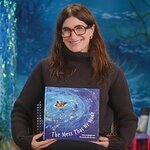By Marianne Schnall on
Natalie Portman recently spoke about her philanthropic interests with our guest contributor, Marianne Schnall.
Natalie Portman is an Oscar-nominated actress who became an international star with her role as Queen Amidala in the “Star Wars” trilogy. She is an advocate of many social causes and was recently named the first Ambassador of Hope for FINCA International, an organization that promotes micro-lending to empower women in poor countries by helping them start their own businesses. She traveled to Africa and South America promoting FINCA’s work and in April 2007 completed a documentary about the power of micro-financing to change lives in impoverished countries.
For people who may not be familiar with FINCA, how would you describe the overall goal or mission of the organization?
Well, it’s a microfinance group and it works in twenty different countries and it will be expanding to more countries this year. And what microfinance does is based on a concept called “village banking,” wherein FINCA will go into a small village and find clients who want to be involved. They’re primarily women, and they start a village bank. So that means the women insure each other’s loan. And they get small loans – they’re called ‘microloans’ – they usually start around fifty dollars, but can go up to five thousand dollars after women have been with FINCA for a while and have proven their responsibility. And the women insure each other while they start these businesses – and they make all their own rules and everything.
And so it basically gives them a way to have agency in their own lives to sort of make their own destiny. Because what you find in these places is that women become sort of slaves to whatever jobs are available – I mean if there’s a factory in town, there’s that one factory and that’s where they have to work. And this allows them to open their own businesses, which means that they can stay home with their children if they need to – they can maybe run the business from home – and they are able to make better wages, so they’re feeding their children better, educating their children better – getting better health care, living conditions – I mean, all the side effects of poverty are helped by this one program. And it’s sustainable, so that you go in once to a village, you put money in once, and that money continues forever – once that money is in the bank, because the women pay back their loans with interest at such incredible rates – it’s like 97, 98% – it’s better than wealthy people in the United States [laughs] – the money continues and it turns over three times a year, so one amount of money serves three women every year – and their families of course.
There has been increasing awareness about the urgency and the growing crisis of world poverty, and people are starting to look at creative solutions – how do you see the role of microfinance contributing to the solution?
Well, it’s definitely just one of many creative solutions that as a package I am sure can help poverty, and the problems associated with poverty. Look – the one thing that I find really shocking, I mean, that is something you don’t learn in school that I was really surprised to find out about, was that not only are two-thirds of the world’s population in poverty, under $3 a day – that’s like 4 billion people – 70% of them are women and children, which I think is shocking. They’re calling it the feminization of poverty – it’s becoming more and more so. And when women are the poor ones in society, are disproportionally making up the world’s poor, you get an imbalance of power obviously between the sexes, which obviously leads to other social inequalities for women, more violence probably, and when a child is brought up into a world where his Dad has money and his mother does not, they might be more likely to follow their father into violence or drunkenness – these are a lot of the sort of problems you find in many of these communities in terms of how children make their choices.
And this gives women power over their sexual reproductive rights: they find the thing closely associated with controlling birth rates is women’s education, which is obviously related to women’s socio-economic status, so the more money a woman has, the more educated she is, and the more educated she is, the more she knows about how to prevent pregnancy, and also has more reproductive control – she feels a greater ability to say no to a man when she doesn’t have to depend on him for money. You really see this chain of events, and obviously women can really be at the core of changing things for the next generation since they are the ones caretaking for the next generation.
There are so many organizations you could have lent your support to, and you have now worked with FINCA for four years – what first attracted you to their cause and how did you first get involved?
Well, I really wanted to work on sort of mid-east peace, because I’m from Israel originally. And I really wanted to work on something with Queen Rania of Jordan, because she’s probably the woman I most admire from my region. And so I got in contact with her and her staff, and they recommended to me to get involved with FINCA, which was something that she was part of. And she talked a lot about the hope gap that exists – that what you’re dealing with in these conflicts is – I mean the economic gap can best be described, in her words, as a hope gap. And it’s true – the despair leads to sort of nihilism, and that can be very, very dangerous. But this hope gap, mending the economic divide, is sort of the first step, or a first step towards bettering the situation we find ourselves in today.
On behalf of FINCA you’ve visited programs in many diverse parts of the world. What are those trips like for you? What are some of your most memorable experiences from these trips?
It’s sort of the most amazing thing – I mean, I’ve gotten so much out of it. The coolest thing is the opportunity to meet these people. These women are incredible. You go to these villages and usually, as an American, when you travel, even if you go to places like Uganda or Guatemala – you’re probably not going to get to interact with locals. And especially not locals who are like living in squalor. You might meet some wealthy people who live there, you might meet people who are working at your hotel or whatever – but to actually be in the villages and get to talk to people is such a lucky experience.
I was in Uganda and I met this woman who had ten children and she had been in FINCA for eleven years. And she had ten children – when she started out her husband was beating her because she couldn’t have a boy. She had only girls. So he had kicked her out and she was living on 80 cents a day. With ten kids. And she was like begging her neighbors to give her like old laundry water just to clean their clothes. And she started on a $50 loan with FINCA eleven years ago, and she now has, I think it’s a $2,000 loan, eleven years later, and she owns a huge restaurant. She sends one of her daughters to university and she employs seven other women in her village.
And you just see like in one generation how someone can turn it around. They are the most amazing people – they’re up against everything you can imagine in the world – I mean, extreme poverty, extreme disease. I mean in Uganda, so many people are affected by AIDS, but also malaria is terrible as well. And their life expectancy is forty-six years old; the average birth rate for every women is 6.7 children per woman, and they all adopt their sibling’s children if they pass away, so it’s just extreme, extreme pressure that I can’t even begin to imagine. And yet they’re so loving and hard-working and positive and find so much joy – not to be completely cheesy about it, but it’s inspiring, and it’s just incredibly moving to be around them.
What is most needed in this area – what can other people do?
Well, going onto the FINCA web site, it’s very easy to contribute to Village Bank. It’s very easy to give. $50 is like a loan for one woman, $5,000 opens an entire bank, so $5,000 will serve twenty women or something. It’s a pretty incredible turn-over. And also just to read up on it. It’s really interesting. I don’t want to be like any sort of like know-it-all [laughs] but I just find it to be such an amazing thing to learn about, how women live in much of the world.
There seems to be greater awareness about the serious issues we are facing, such as world poverty and global warming, which is spurring a growing, hopeful movement for change. What is your perspective on the current situation in the world – are you optimistic?
I am exactly for every reason you’re saying. I see a lot of people really wanting to do positive things in the world. And I feel that it’s like a new generation – I hope. You can only be optimistic because I don’t really know how you’d wake up in the morning if you felt pessimistic. I mean, it’s obviously easy to feel that way with the news – you can watch the news and it feels like it’s the end of the world, very like apocalyptic [laughs]. So I just stay away from the news and try and find people around me who are doing positive things and look to them.
To read the full interview with Natalie Portman, visit feminist.com.
Copyright © 2008 Look to the Stars






